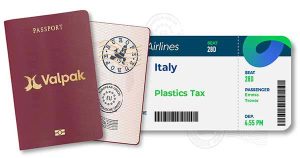GIS: Generating insights in sustainability
Valpak Sustainability analyst, Michael Wetherill, explains how GIS turns complex spatial data into clear, practical insights for teams tackling recycling, logistics and climate challenges.
Read MoreAfter delays due to the COVID-19 pandemic, the Italian plastic tax is now expected to be implemented in January 2022. Emma Trevor, Valpak’s International Account Manager, explores the requirements of this tax.

This tax is to be introduced under the ‘2020 Italian Budget Law’ and will obligate producers of single-use plastic products.
While the Italian Government has chosen to pass the charge onto the supply chain, the tax will be charged at €450 per tonne with a remaining €350 per tonne being covered by the state.
Due for payment once a product is released onto the market, the tax covers single-use plastic packaging which is made wholly or partially of organic polymers of synthetic origin, is created for the purpose of containment, protection, handling, or shipment of goods or foodstuffs, and is not intended to be reused.
Packaging products caught by the tax will include bottles, bags, tetra packs, food containers made of polyethylene, packaging made from expanded polystyrene, bubble wrap, and plastic caps. The tax will also apply to semi-finished products used to produce single use plastic packaging.
The tax is only to be paid on the virgin plastic content of the product and there are a limited number of exemptions, including single-use plastics which are compostable, medical devices, or intended for protection of medicines.
For single-use plastic packaging produced in Italy, either the person or producer that first places the packaging onto the market is obligated.
For packaging produced outside of Italy, it is the importer who will bear the obligation.
If the importer is a private consumer of a product which has come from another EU member state, the foreign seller will be obligated to pay the tax.
Paying the tax shall be done through the process of a quarterly tax return submitted to the Customs Agency.
The declarations must detail production data, including processing volumes, the quantity of plastic packaging subject to tax, the amount of tax already settled, and the amount of tax not due or to be refunded.
Returns shall be due by the end of the month following the calendar quarter to which the tax return refers, and payment will be due by the same deadline.
Penalties for non-compliance have also been established, at €250 to €2,500 for late returns, two to five times the tax evaded for those failing to pay at all, and 25% of tax due for late payments.
If your business is affected by environmental legislation overseas, we will remove the administrative and resource intensive burden of complying and have a range of services that can be tailored to suit your business’s needs.
To find out more about international environmental legislation and how we can help please call us on 03450 682 572 or complete our online enquiry form.